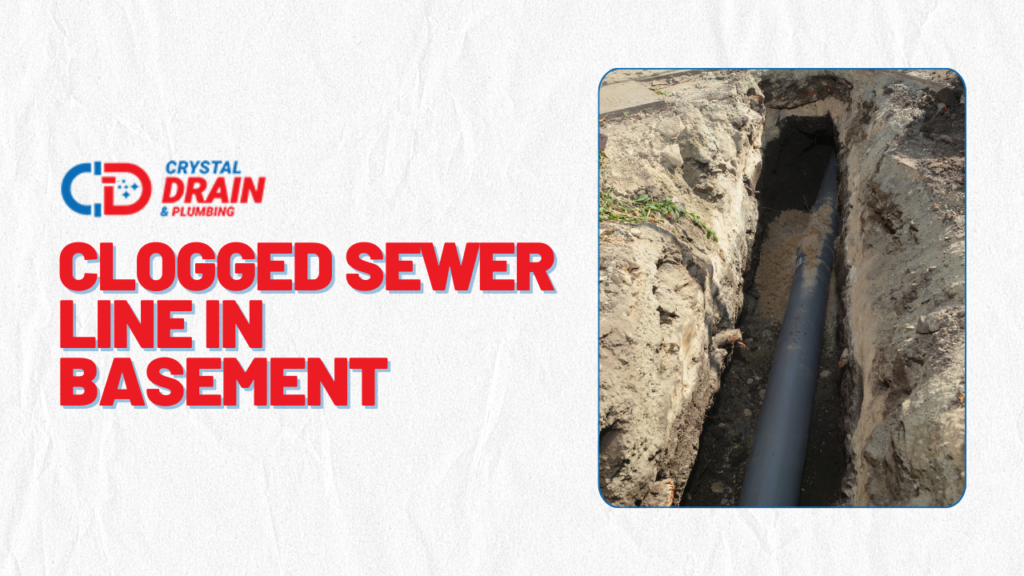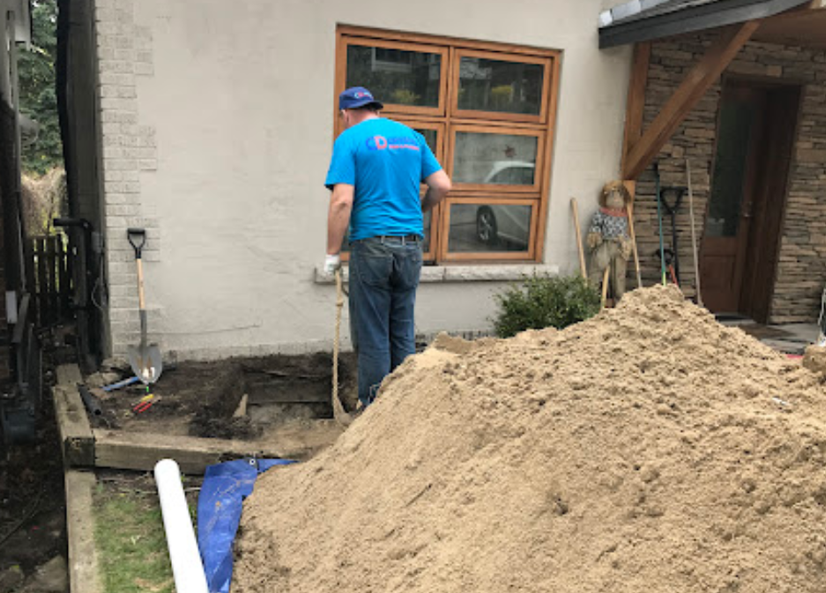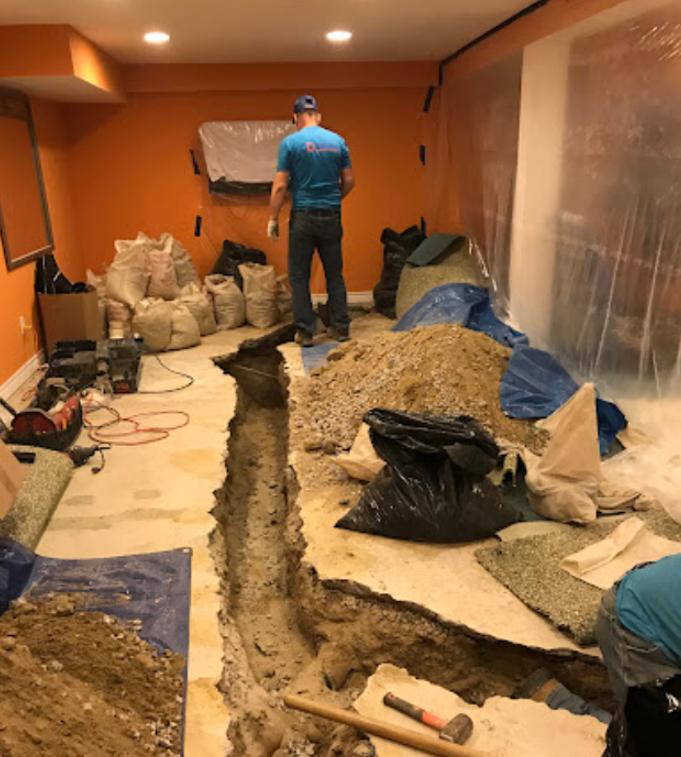Clogged Sewer Line In Basement

A clogged sewer line in your basement can cause more than just a minor inconvenience; it can lead to significant issues that affect the comfort, safety, and health of your home environment. At Crystal Drain & Plumbing, we’re experts in identifying, addressing, and preventing these issues to ensure your basement remains dry and fully functional.
Causes of Basement Sewer Line Clogs
1. Foreign Objects: Non-degradable items flushed down the drain can create serious blockages.
Solution: To address blockages from foreign objects, a professional plumber will typically use a plumbing snake to dislodge and remove the clog. Preventive measures such as installing drain guards or catchers in both sinks and toilets can significantly reduce the likelihood of blockages by trapping foreign objects before they enter the sewer lines.
2. Tree Root Intrusion: Tree roots can grow into the cracks and joints of sewer pipes in search of water, leading to serious obstructions and damage.
Solution: Remedying tree root intrusion usually involves mechanically cutting the roots and possibly applying root-killing chemicals to discourage regrowth. Severely damaged pipes may need to be replaced or repaired using trenchless methods, which involve relining the existing pipe with a new, seamless material that is impervious to roots.

3. Pipe Scale and Grease Buildup: The accumulation of minerals and grease inside pipes can reduce the diameter through which wastewater can flow, leading to backups.
Solution: Clearing scale and grease buildup often requires hydro-jetting, a process that uses high-pressure water streams to scour the pipe interiors. To prevent future buildups, homeowners should avoid disposing of grease in drains and consider water softeners if hard water is a concern.
4. Structural Defects: Includes issues like cracks, misalignments, or collapses within the sewer line infrastructure, which can impede flow and cause backups.
Solution: Structural defects may necessitate pipe repair or replacement. Techniques such as pipe bursting or slip lining can repair pipes without extensive excavation. Regular video inspections can diagnose such issues early before they lead to failures.
5. Heavy Rainfall: Intense storms can quickly overwhelm both public and private sewer systems, leading to backflows.
Solution: Installation of backwater valves can prevent surcharged water from reversing into the house. Enhanced surface water management strategies, such as installing rain gardens, can also divert storm runoff from the sewer system.

6. Aging Sewer Systems: Deterioration due to age can make sewer pipes more susceptible to all forms of damage and blockages.
Solution: Older sewer systems may require a comprehensive assessment and overhaul. Replacing old sections with modern materials like PVC can significantly reduce the risk of collapses and clogs. Regular maintenance schedules can help extend the lifespan of the system by catching issues early.
7. Wash Tub Basin Backups: Clogging can happen in drain strainers or the trap under the basin.
Solution: Regular cleaning of the strainers and traps is vital. If backups occur, physically removing debris or employing a small hand snake can clear the line. Installation of better-designed strainers that catch more debris can prevent future clogs.
8. Washing Machine Backups: Blockages occur either in the machine’s drain hose or in the sewer line it drains into, both results in backups.
Solution: Regularly inspect and clean out the drain hose strainer. For persistent issues, a plumber may need to snake the line to clear blockages further down. Installing a lint catcher on the end of the drain hose can also prevent material from entering the sewer line.
9. Floor Drain Backups and Sewer Smells: These are typically due to a full or clogged main line, or a dry trap allowing gases to escape.
Solution: Floor drains should periodically be flushed with water to maintain a water seal in the trap that prevents gas escape. For backups, a backwater valve can prevent upstream flooding, while professional snaking or jetting may be required to clear deep clogs.
10. House Sewer Trap Clogs and Seepage: Issues here can be particularly troublesome and messy, often resulting from a clogged or damaged main house trap.
Solution: This often requires specialist intervention to open the trap and physically clear out debris. Regular maintenance checks can prevent such blockages, and any damage to the trap should be repaired promptly to ensure reliable operation.
Effective Solutions for Clearing Clogged Basement Sewer Lines
Once the issue has been identified, addressing it efficiently and safely is crucial. Here are some proven methods we employ at Crystal Drain & Plumbing to clear clogged basement sewer lines:
Mechanical Snaking:
This traditional method involves using a robust metal cable that maneuvers through the sewer line to dislodge and break up simple blockages, making it ideal for straightforward clogs.
Hydro Jetting:
For more stubborn blockages composed of grease, debris, and roots, we use high-pressure water jetting. This method effectively scours the inner walls of pipes, clearing away buildup without damaging the pipes themselves.
Sewer Line Repair or Replacement:
In cases where damage is extensive, such as severe cracks, collapses, or old, corroded pipes, the best course of action may be to repair or completely replace the affected sections of the sewer line. This ensures a long-term solution that prevents future issues.
Video Camera Inspection:
Before and after mechanical interventions, we use video cameras to inspect the sewer lines. This advanced technology allows us to identify the exact nature and location of the blockage or damage, ensuring precision in our approach and verifying the clear state of the pipes post-treatment.
Chemical Treatments:
Sometimes, chemical agents are required to help dissolve stubborn clogs, especially those involving non-organic materials. We use eco-friendly chemicals that are powerful against blockages but gentle on your pipes and the environment.
Preventative Maintenance Services:
To prevent future clogs and to maintain the health of your sewer lines, we offer ongoing maintenance services. Regular inspections and cleanings can help catch issues before they escalate into major blockages or damage.
These diverse and comprehensive approaches ensure we can effectively tackle any issue within your basement’s sewer lines, restoring functionality and peace of mind with minimal disruption to your daily life.
How To Prevent Sewer Line Clogs In Basement
Maintaining a clear and functional sewer line in your basement starts with preventative measures. Here are effective strategies to help avoid clogs and ensure seamless operation:
- Proper Disposal Practices: Avoid flushing non-biodegradable items such as wipes, cotton swabs, and feminine hygiene products. These items do not break down and are common culprits for blockages.
- Regular Drain Cleaning: Schedule regular cleaning sessions to remove build-up before it becomes a blockage. This includes professional hydro jetting which can thoroughly clean pipes.
- Install Drain Screens: Placing screens over drains can catch hair, soap bits, and other debris, preventing them from entering the pipes.
- Mindful Kitchen Disposal: Be careful with what goes down the kitchen sink. Avoid disposing of grease and food scraps in the drain. Instead, use grease cans for oil and food disposal units for leftovers, or better yet, compost if possible.
- Tree Root Control: If trees are near your sewer lines, consider regular root treatment services to prevent tree roots from intruding and damaging pipes.
- Regular Inspections: Have a professional inspect your sewer lines periodically to check for early signs of damage or blockages that could lead to more serious issues.
By adopting these simple habits and maintenance routines, you can significantly reduce the risk of experiencing a disruptive sewer line clog in your basement.

The Process of Unclogging Basement Sewer Lines
Clearing a clogged basement sewer line involves several steps designed to efficiently and effectively remove the blockage and restore proper flow. Here’s how professionals at Crystal Drain & Plumbing handle this common issue:
- Initial Assessment: The process begins with a detailed assessment using diagnostic tools such as video camera inspections. This step helps identify the exact location and nature of the clog.
- Choosing the Right Method: Depending on the assessment results, the appropriate technique is selected. For simpler clogs, mechanical snaking might suffice. More complex blockages may require hydro jetting, which uses high-pressure water streams to break up and wash away debris.
- Implementation: The chosen method is carefully implemented to ensure thorough cleaning without damaging the pipes. Techniques are adjusted based on the pipe material and the type of clog.
- Verification: After clearing the blockage, another camera inspection is often conducted to ensure that all debris has been removed and the sewer line is fully restored.
- Preventative Advice: Once the clog is cleared, technicians provide homeowners with advice and preventative measures to avoid future issues, such as regular maintenance checks and tips on what should not be disposed of via the sewer system.
By following these steps, Crystal Drain & Plumbing ensures that your basement’s sewer line is unclogged with minimal disruption to your home, providing a long-term solution to maintain the health of your plumbing system.
Trust Crystal Drain & Plumbing for Your Basement Sewer Line Troubles
Experience swift and dependable solutions for clogged basement sewer lines with Crystal Drain & Plumbing. Our skilled professionals use advanced techniques to effectively clear blockages, ensuring your plumbing system operates smoothly. Committed to top-notch service and customer satisfaction, Crystal Drain & Plumbing is your go-to choice for meticulous care and lasting results. Choose us for peace of mind and a clear flow in your home.
FAQs About Clogged Sewer Line In Basement
Simple clogs might be resolved in a few hours, while more complex issues requiring repairs or extensive cleaning might take longer. A professional plumber can provide a more accurate time frame after assessing the situation.
Signs of a clogged basement sewer line include water backing up in the basement drains, gurgling sounds from the drains, slow draining, and unpleasant odors emanating from the basement area.
If you suspect a clog, avoid using any plumbing below the clog level and contact a professional immediately. Using the plumbing could worsen the backup and increase damage. It’s best handled by experts like those at Crystal Drain & Plumbing who have the right tools and experience.
Yes, regular maintenance such as professional cleanings, avoiding flushing inappropriate items, and installing drain strainers can significantly reduce the risk of clogs. Additionally, consider periodic inspections and tree root management if your property has large trees near the plumbing lines.
